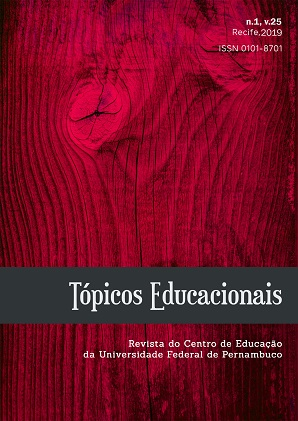The Importance of Scientific Literacy
DOI:
https://doi.org/10.51359/2448-0215.2019.244560Keywords:
Scientific Literacy, Teaching Natural Sciences, Elementary SchoolAbstract
This article seeks to analyze the importance of scientific literacyin the in the teaching of Natural Sciencesin elementary school. It is expected to assist in the introduction and development of Natural Sciences classesemphasizing this teachingto Scientific Literacy. It is a fact thatteacher trainingis a factor of great relevancein the Scientific Literacy. In the face of this complex situationaims to discuss these issueswith the intention of introducing experimental activitiesin the teaching of natural sciences. Experimentation is fundamental for learning natural sciences, because through experience the child understands and relates theoretical and practical concepts.
References
BRASIL. Ministério da Educação e do Desporto. Secretaria de Educação Fundamental. Parâmetros curriculares Nacionais: Ciências Naturais. Brasília: MEC/SEF, 1997
CACHAPUZ, A.; GIL-PÉREZ, D.; CARVALHO, A. M. P.; PRAIA, J.; VILCHES, A. A necessária renovação do Ensino das Ciências. 3.ed. São Paulo: Cortez, 2011.
CAZELLI, S. (1992). Alfabetização científica e os museus interativos de ciência. Rio de Janeiro: Departamento de Educação PUC/RJ. Dissertação de Mestrado.
CERRI, Yara Lygia Nogueira Sáes; TOMAZELLO, Maria Guiomar Carneiro. Crianças aprendem melhor por meio da experimentação? In:PAVÃO, A. C. e FREITAS, D. (org.). Quanta Ciência há no Ensino de Ciências, Edufscar, São Carlos: EdUFSCar, 2011.
CORDEIRO, M; VITÓRIA, C. & HENRIQUE, M. Aulas com Experimentos Básicos – Um Fator Estimulante para o Ensino de Física. In: XIII Encontro de Pesquisa em Ensino de Física. Foz do Iguaçu, 2011. Anais. Foz do Iguaçu: XIII Encontro de Pesquisa em Ensino de Física, 2011.
CORTELLA, M. S. O que é a pergunta? 1.ed. São Paulo: Cortez, 2008
DELIZOICOV, D.; LORENZETTI, L. Alfabetização científica no contexto das séries iniciais.Ensaio.v.3,n.1,jun.2001.Disponívelem:http://www.portal.fae.ufmg.br/seer/index.php/ensaio/article/viewFile/35/66 Acesso em 22 out. 2017
FERREIRO, Emilia. Com todas as Letras. 4º edição. São Paulo: Editora Cortez, 1993
FRACALANZA, Hilário; AMARAL, Ivan Amorosino do; GOUVEIA, Mariley Simões Flória. O ensino de ciências no primeiro grau. São Paulo: Editora Atual, 1986.
GASPAR, A. Experiências de Ciências para o Ensino Fundamental. São Paulo: Ática, 2009.
LEFRANÇOIS, Guy R. Teorias da Aprendizagem. Tradução: Vera Magyar. 5ª edição. São Paulo: Cengage Learning, 2008.
LONGHINI, M. D. O conhecimento do conteúdo científico e a formação do professor das séries iniciais do ensino fundamental. Investigações em Ensino de Ciências, v. 13, n. 2, p.241-253, 2008.
LORENZETTI, L. Alfabetização científica no contexto das séries iniciais. Dissertação (Mestrado em Educação), Universidade Federal de Santa Catarina, Florianópolis – SC, 2000.
MARTINS, I. P.; PAIXÃO, M. de F. Perspectivas atuais ciência-tecnologia-sociedade no ensino e na investigação em educação em ciência. In: SANTOS, W. L. P. dos; AULER, D. (Orgs.). CTS e educação científica: desafios, tendências e resultados de pesquisas. Brasília: Editora Universidade de Brasília, 2011.
MORTIMER, E.F. E MACHADO, A.H., (2009). A Linguagem em uma Aula de Ciências, Presença Pedagógica, v.2, n.11, 49-57.
SOARES, M., (1998). Letramento: um tema em três gêneros, Belo Horizonte: Autêntica.
VASCONCELLOS, C. D. S. Planejamento: plano de ensino: aprendizagem e projeto educativo. 4.ed. São Paulo: Libertado, 1995.
Published
Issue
Section
License
Copyright (c) 2020 Tópicos Educacionais

This work is licensed under a Creative Commons Attribution 4.0 International License.
Authors who publish in this journal agree to the following terms:
a) Authors retain copyright and grant the journal the right of first publication, with the work simultaneously licensed under the Creative Commons license: org/licenses/by/4.0, which allows sharing the work with acknowledgment of its authorship and initial publication in this journal.
b) This journal provides public access to all its content, as this allows for greater visibility and reach of the articles and reviews published. For more information about this approach, visit the Public Knowledge Project, a project that developed this system to improve the academic and public quality of research, distributing the OJS as well as other software that supports public access to academic sources. Names and email addresses provided on this site will be used exclusively for the purposes of the journal and will not be made available for other uses.









